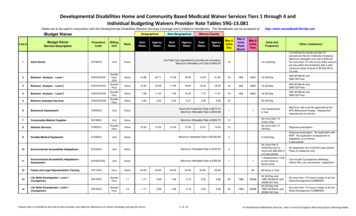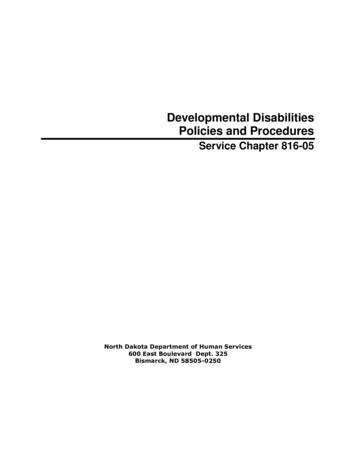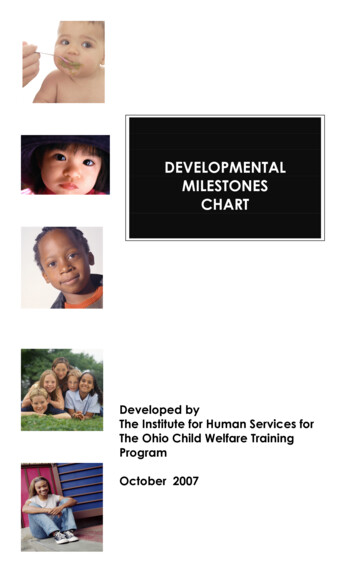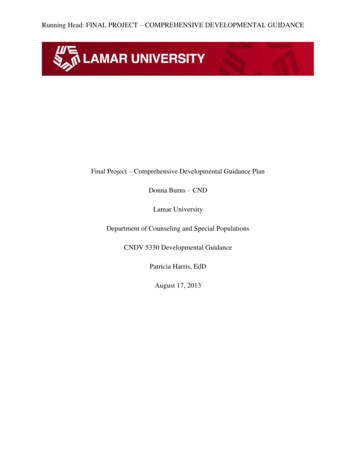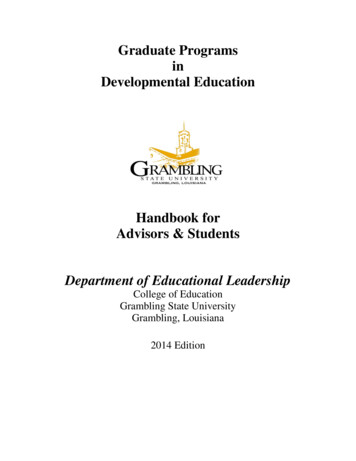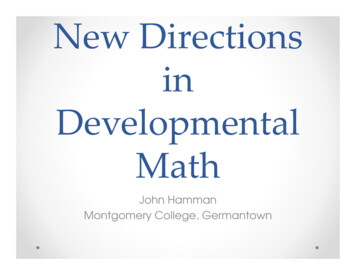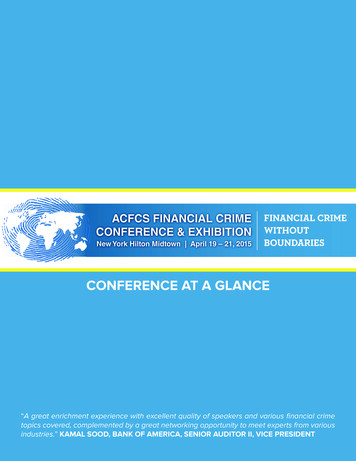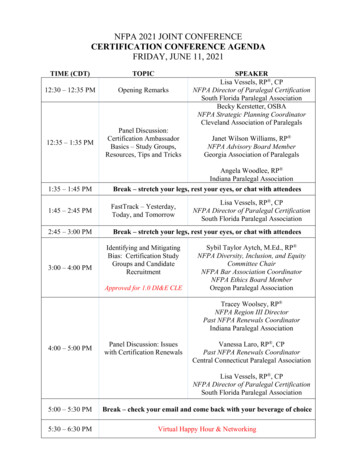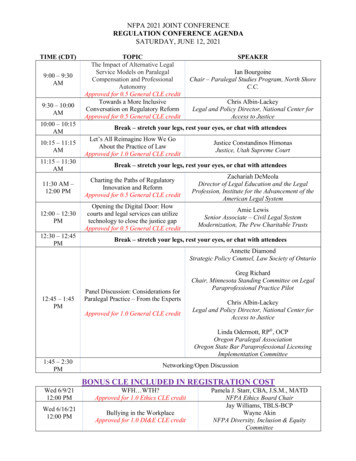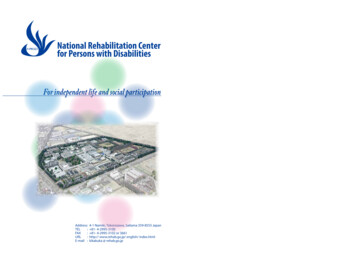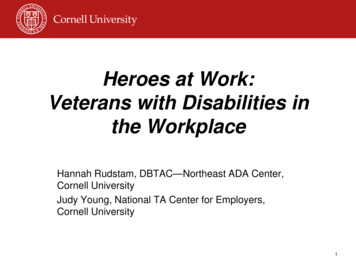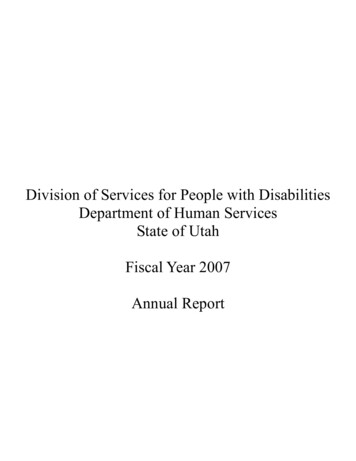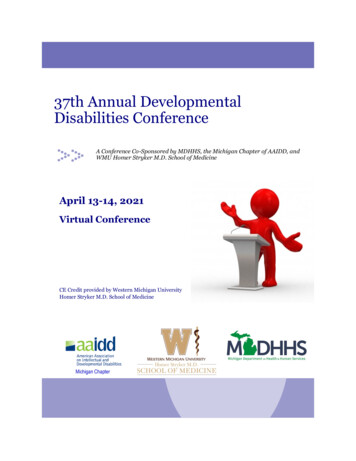
Transcription
37th Annual DevelopmentalDisabilities ConferenceA Conference Co-Sponsored by MDHHS, the Michigan Chapter of AAIDD, andWMU Homer Stryker M.D. School of MedicineApril 13-14, 2021Virtual ConferenceCE Credit provided by Western Michigan UniversityHomer Stryker M.D. School of MedicineMichigan Chapter
Page 237th Annual Developmental Disabilities ConferenceTable of ContentsOverview & Objectives . 3Planning Committee . 4Presenters . 5Conference Schedule . 7Conference Information . 15Sponsors . 17
37th Annual Developmental Disabilities ConferencePage 3Overview & ObjectivesOverviewThe Annual Developmental Disabilities Conference will focus on issues related to healthcare, social, community, and educational services which are of critical importance to the future of persons with developmental disabilities. The program will provide an overview of issues related tothe spectrum of services currently available as well as strategies for enhancing these services.The program format is designed to present a variety of expert viewpoints to encourage interaction with health professionals. The combination of didactic and workshop format will allow ample opportunity for participants to engage in discussion with the presenters.This educational program is designed for physicians, nurses, psychologists, social workers, therapists, nutritionists, educators, home care providers, and other professionals interested in the delivery of care and services to persons with developmental disabilitiesObjectivesFrom attending this conference, professionals in developmental disability care will be able to: Identify effective methods for the practical application of concepts related to improvingthe delivery of services for persons with developmental disabilities. Identify advances in clinical assessment and management of selected health care issuesrelated to persons with developmental disabilities. Discuss the ethical issues related to persons with developmental disabilities. Identify and emphasize attitudes that enhance the opportunities for persons with developmental disabilities to achieve their optimal potential. Develop strategies to promote community inclusion in meeting the needs of personswith developmental disabilities.
Page 437th Annual Developmental Disabilities ConferencePlanning CommitteeNIECIA ANJORIN, LMSWWMU Homer Stryker M.D.School of MedicineTERESA BAILEY, PharmDFerris State UniversityCollege of PharmacyJUDITH BRADY, PhDMichigan State UniversityCollege of Human MedicineDIANE CIRICAHS Community Services, Inc.TONY C. KIM, MDCommunity Living ServicesJEANA KOERBER, PhD, BCBA-D, LBAGreat Lakes Center for AutismTreatment and ResearchMARK LAMAN, PhDDevelopmental EnhancementBehavioral HealthDIANE L. MCCALL, MS, RNWayne CenterEMILY OSTROWSKI MS, RDSparrow Health SystemDILIP R. PATEL, MD, MBAConference Co-ChairWMU Homer Stryker M.D.School of MedicineChildren’s Special Healthcare ServicesCOURTNEY PUFFER, MAConference CoordinatorWMU Homer Stryker M.D.School of MedicinePRICE PULLINS, MAConference Co-ChairMichigan Department of Health & Human ServicesCHARLYSS RAY, OTR-LMichigan Department of Health & Human ServicesMARY SHEHAN-BOOGAARDMichigan Developmental Disabilities CouncilNEEL SOARES, MDWMU Homer Stryker M.D.School of MedicineJANE TURNER, MDProfessor Health Programs, Pediatrics and HumanDevelopmentMichigan State University
37th Annual Developmental Disabilities ConferencePage 5PresentersAMELIA ALLEN LLMSWMichigan Developmental Disabilities InstituteWayne State UniversityANNETTE DOWNEY MSA,LBSWCommunity Living ServicesJULIE FITZSIMONSROGER APPLE PHDWMU Homer Stryker MDSchool of MedicineTERESA BAILEY, PHARMDFerris State UniversityCollege of PharmacyBRITTANY BATELL MPH, MSWMichigan Organization onAdolescent Sexual HealthLEONARDO BRAVOMICHAEL BRAY MA, EdSMichigan Developmental Disabilities InstituteKRISTIN BROOKS 500 hr Yoga Instructor,LYB Yoga CertifiedHill Top YogaOrigami Brain Injury Rehabilitation CenterCALVIN GAGE MA, LBA, BCBAThe Great Lakes Center for AutismMIRANDA GRUNWELL BSDisability Network Southwest MichiganDAWN GUBANC-ANDERSON DNP, RN, NE-A, BC,FACHEChamberlain UniversityHEATHER HALLETT LLBSWLenawee County Community Mental HealthJULIA HERNANDEZ MAMichigan Developmental Disabilities InstituteWayne State UniversityELIZABETH JANKS LMSW, ACSWMichigan Developmental Disabilities InstituteWayne State UniversityJAMIE JUNIORKARLEY BROUWER CTRS, CDP, CBIS,LYB Yoga CertifiedOrigami Brain Injury Rehabilitation CenterSALLI CHRISTENSONMichigan Developmental Disabilities InstituteWayne State UniversityKRISTI DAVIS CTRSAlzheimer’s AssociationSTEPHANIE DIPONIO MSWMichigan Organization onAdolescent Sexual HealthALEX KIMMELCASEY KLOOSTERMANPHARMD CandidateFerris State UniversityCollege of PharmacyRYAN KLOTZJEANA KOERBER PHD, BCBA-D, LBAGreat Lakes Center for AutismTreatment and Research
Page 6PresentersHANNAH LEHRER DNP, MSN, RN ,CNEChamberlain UniversityAMY PECKINPAUGH LBSWMichigan Developmental Disabilities InstituteWayne State UniversityBLAKE PERRYMARY SHEHAN-BOOGAARD MS, QSEMichigan Developmental Disabilities CouncilRAJIV TANDON MDWMU Homer Stryker MDSchool of MedicineFRANK VACAGovernor’s Autism CouncilTRACY VINCENTMichigan Developmental Disabilities CouncilKATIE WHITE MAWMU Homer Stryker MDSchool of Medicine37th Annual Developmental Disabilities Conference
37th Annual Developmental Disabilities ConferencePage 7Conference ScheduleTuesday, April 138:45 amWelcoming Comments9:00 am –10:00 amPlenary AddressPatricia Haney, RN Memorial Lecture:Mental Developmental Disabilities Circa 2020: New Concepts and DefinitionsRajiv Tandon, MDThere has been a significant change in our conceptualization of mental developmental disorders, leading to substantial revisions in their definition and characterization in DSM-5. In this presentation, the range of generalizedintellectual disability, specific learning disabilities, communication disorders, autism, ADHD, and motor disorders will be reviewed, changes will be summarized, and their clinical and treatment implications will be discussed.10:00 amBreak10:15 am –11:15amConcurrent WorkshopsA1Intersecting Identities: Being LGBTQ with an Intellectual or Developmental DisabilityBrittany Batell, MPH, MSW; Stephanie DiPonio MSW; and Frank VacaThis workshop, co-facilitated by sexual health professionals and self-advocates, will illustrate the diversity of sexuality among people with I/DD. We will define LGBTQ terminology, review statistics, and deconstruct commonmyths, stereotypes, and stigmas. Presenters will share their personal experiences with navigating their identitiesas both having I/DD and being LGBTQ. Participants will leave with an understanding of how to be more inclusiveand affirming of people of all sexual orientations and gender identities.Trends, Mental Health/Psychiatry, Issues in Transition/Education, On the Front LinePractice Level: Beginner
37th Annual Developmental Disabilities ConferencePage 8Conference ScheduleA2Prescribing Patterns of Second-Generation Antipsychotics in Pediatrics Patients: FDAindications vs guidelines.Teresa Bailey, PharmD & Casey Kloosterman, PharmD CandidateSix second generation antipsychotic (SGA) medications are approved to treat pediatric schizophrenia, Tourette’sdisorder, bipolar I disease and irritability associated with autism spectrum disorder. Several SGAs are used offlabel for other diagnoses. Safety concerns include extrapyramidal symptoms, weight gain, metabolic changes, sedation, tachycardia and suicidal risk. Research will be presented regarding SGA prescription patterns of prescribing and monitoring and to determine the extent to which published practice guidelines are followed.Medical, Mental Health/PsychiatryPractice Level: BeginnerA3Disability Language and Etiquette (Part 1)Miranda Grunwell, BSThe language we use is powerful and can reveal hidden assumptions we might not realize we have. Our words canbe hurtful even when well-intended. This workshop is designed to allow participants to explore new ideas andchallenge some assumptions about what it means to live with a disability. Ableism shows up in our organizationswhether we intend it to or not. We hope you learn new ways of thinking and talking about disability.Trends, Issues in Transition/EducationPractice Level: Beginner11:15 am—11:30 amBreak11:30 am –12:30 pmConcurrent WorkshopsB1Trauma-Informed Care for People with Intellectual and Developmental DisabilitiesBrittany Batell, MPH, MSW; Stephanie DiPonio MSW; and Frank VacaThis workshop, co-facilitated by sexual health professionals and self-advocates, will give participants a foundational understanding of sexual abuse vulnerabilities and disparities for people with I/DD. We will define traumainformed and healing-centered principles as well as concrete practices, and discuss how participants can applythem in multiple settings.Medical, Trends, Mental Health/Psychiatry, Issues in Transition/Education, On the Front LinePractice Level: Beginner
37th Annual Developmental Disabilities ConferencePage 9Conference ScheduleB2Home Safety and Environmental Modifications for People with DevelopmentalDisabilities and DementiaKristi Davis, CTRSThis workshop will include strategies and suggestions for helping people with developmental disabilities and comorbid dementia stay in their home. In this presentation we will discuss how to assess the environment and theperson for safety, learn about safety issues for different stages of dementia, and learn about dementia-friendlyenvironments and modifications that can be made.Mental Health/Psychiatry, On the Front LinePractice Level: BeginnerB3Disability Language and Etiquette (Part 2)Miranda Grunwell, BSThe language we use is powerful and can reveal hidden assumptions we might not realize we have. Our words canbe hurtful even when well-intended. This workshop is designed to allow participants to explore new ideas andchallenge some assumptions about what it means to live with a disability. Ableism shows up in our organizationswhether we intend it to or not. We hope you learn new ways of thinking and talking about disability.Trends, Issues in Transition/EducationPractice Level: Beginner12:30 pm –1:30 pmLunch Break and Exhibits
37th Annual Developmental Disabilities ConferencePage 10Conference Schedule1:30 pm — 2:30 pmC1Concurrent WorkshopsAdvanced Person-Centered Planning – Back to BasicsCancelledC2HCBS Toolkit for Individuals, Family Members, and OrganizationsAmy Peckinpaugh, Amelia Allen, Salli Christenson, HCBS TrainersThis session is intended for individuals, family members, and community mental health staff. Participants willlearn about the Home and Community Based Services Final Rule and the Michigan Developmental DisabilitiesInstitute’s (MI-DDI) collaboration with the Michigan Department of Health and Human Services (MDHHS) andthe Michigan Developmental Disabilities Council (MDDC) on HCBS transition. HCBS Trainers will share theirexperiences and lessons learned from facilitating HCBS trainings in their communities.Mental Health/Psychiatry, Issues in Transition/EducationPractice Level: BeginnerC3Making New Connections: Brain and Body Wellness through YogaKarley Brouwer CTRS, CDP, CBIS, LYB Yoga CertifiedKristin Brooks 500 hr Yoga Instructor, LYB Yoga CertifiedThe LoveYourBrain (LYB) Foundation developed a research-based yoga and meditation program specifically tailored for the TBI community in order to help improve and restore wellbeing. Learn how Origami Brain InjuryRehabilitation Center partnered with LYB, the first clinical partnership in the country, to bring the FUNdamentalYoga Series to survivors and caregivers in the Mid-Michigan area. During the session you will explore a breathingexercise and guided meditation, learn about the benefits of yoga practice, and receive tips for incorporating yogaand meditation activities at home.Medical, Trends, Mental Health/PsychiatryPractice Level: Intermediate2:30 pmDay 1 Adjourned
37th Annual Developmental Disabilities ConferencePage 11Conference ScheduleWednesday, April 148:45 amWelcoming Comments9:00 am—10:00 amPlenary AddressDennis Lyne, MD Memorial Lecture:Diagnostic Overshadowing in Children and Adolescents with Developmental DisabilitiesKatie White, MA and Roger W. Apple PhDDiagnostic Overshadowing is the tendency to overlook or ignore symptoms of mental or physical illness and attribute these symptoms to the primary diagnosis (developmental disability). Our presentation will describe theimportance of assessment in identifying comorbid conditions often present with Intellectual and DevelopmentalDisabilities10:00 am—10:15 amBreak10:15 am –11:15 amConcurrent WorkshopsD1Parent Satisfaction in Children with Developmental DisabilitiesHanna Lehrer DNP, MSN, RN, CNE & Dawn Gubanc-Anderson DNP, RN, NE-A, BC, FACHEThe measurement of parent satisfaction is one of the most vital practices a program can perform to better helpthose who utilize their services. This presentation involves the discussion of a revised person-centered approachmodel that includes the dissemination of a parent satisfaction survey. Together we will engage in thoughtful discussion with our peers, brainstorm new ideas for each role in this wonderful community, and strategize ways toempower those we serve.Medical, On the Front LinePractice Level: Beginner
37th Annual Developmental Disabilities ConferencePage 12Conference ScheduleD2Supported Decision-Making: Tools You Can Use (Part 1)Mary Shehan-Boogaard MS, QSEThis workshop will describe Supported Decision-Making and many alternatives to guardianship aimed at supporting people with Intellectual and Developmental Disabilities (I/DD), to be autonomous adults. Resources andtools will be shared that help Individuals with I/DD, families, and professionals to map out the decision-makingprocesses. Participants will leave with a Supported Decision-Making Resource Manual.Issues in Transition/Education, On the Front LinePractice Level: BeginnerD3Using ABA Services to Ensure Successful Transitions from Youth to Adult ServicesJeana Koerber PhD, BCBA-D, LBAMoving from the children’s system to the adult system can be difficult for any consumer. However, adolescentswith autism and a history of challenging behavior are sometimes the most vulnerable during this time. Learn howOutpatient ABA services and waiver services have been used to ensure transitions into adult placements were successful.On the Front LinePractice Level: Beginner11:15 am - 11:30 amBreak11:30 am—12:30 pmConcurrent WorkshopsE1Let’s Bring the Sexy Back to Self-DeterminationAnnette Downey MSA, LBSWThis is a presentation focused on the ultimate purpose of our important work – empowering people with developmental disabilities to lead self-determined lives based on THEIR preferences and control over their services.“Getting great services” is obviously not the goal of our work -“GETTING A GREAT LIFE” is. Let’s try to bring thepassion back to the values that have made Michigan a leader in the disability rights movement!Trends, Issues in Transition/EducationPractice Level: Beginner
37th Annual Developmental Disabilities ConferencePage 13Conference ScheduleE2Supported Decision-Making: Tools You Can UseMary Shehan-Boogaard MS, QSE(Part 2)This workshop will describe Supported Decision-Making and many alternatives to guardianship aimed at supporting people with Intellectual and Developmental Disabilities (I/DD), to be autonomous adults. Resources andtools will be shared that help Individuals with I/DD, families, and professionals to map out the decision-makingprocesses. Participants will leave with a Supported Decision-Making Resource Manual.Issues in Transition/Education, On the Front LinePractice Level: BeginnerE3The MI-OCEAN Project: Strategies to Improve Quality of Life for Aging CaregiversElizabeth Janks LMSW, ACSW and Julia Hernandez MAThe primary goal of the MI-OCEAN project is to address the needs and health concerns of caregivers over the ageof 55 to adults with neurodevelopmental disabilities. The project uses a family support, peer model to identify andaddress various issues that may negatively impact the health and well-being of caregivers and those that dependon them. The goal of this statewide project is to, reduce stress, and improve both health outcomes and quality oflife for the Caregiver and the person they support.Trends, Issues in Transition/EducationPractice Level: Beginner12:30 pm—1:30 pmLunch Break and Exhibits
37th Annual Developmental Disabilities ConferencePage 14Conference Schedule1:30 pm—2:30 pmConcurrent WorkshopsF1What's the Worst That Could Happen: Understanding the risks of poorly informedbehavioral treatmentCalvin Gage MA, LBA, BCBABehavioral treatment planning requires a significant amount of information regarding a consumer and the challenging behavior they exhibit. The presentation will examine the importance of conducting a complete and detailed functional assessment. This will be done through case examples in which critical information was not considered resulting in short term poor outcomes.TrendsPractice Level: Beginner/IntermediateF2Autonomous Vehicles and Persons with Disabilities: Ensuring Stakeholder Voices areHeard Before, During and After Design and DeploymentMichael Bray BA, Ed.S.Autonomous, or driverless, vehicles are a quickly emerging technology that holds great promise for increased mobility, inclusion, and independence for persons with intellectual and developmental disabilities. This workshopwill discuss a current autonomous vehicle research project being conducted by the Michigan Developmental Disabilities Institute (MI-DDI). The goal of the project is to ensure that the voices of individuals with disabilities areheard by those designing, developing, and deploying this promising technology.TrendsPractice Level: BeginnerF3Charting the Course to a Good LifeTracy Vincent and Heather Hallett LLBSWDo you believe all people have the right to live, love, work, play and pursue their life aspirations in their community? If so, we invite you to join us as we provide an introduction to Charting the LifeCourse, a framework designed by and for individuals and families at any age or stage of life to think about what they need to know, identify how to find or develop supports, and discover what it takes to live the lives they want to live. We will demonstrate how three tools developed from the framework can be used to have meaningful conversations with individuals to plan for present and future life outcomes that take into account all facets of life and have life experiencesthat build on self-determination, social capital, economic sufficiency and community inclusion.Issues in Transition/EducationPractice Level: Beginner
Page 1537th Annual Developmental Disabilities ConferenceConference InfoRegistrationThe registration fee includes admission to the virtual conference only. Confirmation notices will be sent by email.Registration can be completed at: tionsAll cancellations must be received in writing email, and are subject to a 10% cancellation fee. If you cancel with1-6 business days notice, between April 5th and April 12th, you will receive a 50% refund. No refunds will be issued after the conference begins. Send cancellation notices to ce@med.wmich.edu .ADATo discuss disability accommodation, please email ce@med.wmich.edu.Three week’s advance notice is appreciated.CertificatesRecord of Attendance Certificates will be available upon completion of an online evaluation form. Paper certificates will not be distributed at the conference.Conference AccessLinks for each breakout s
Wayne State University ROGER APPLE PHD WMU Homer Stryker MD School of Medicine TERESA BAILEY, PHARMD Ferris State University College of Pharmacy BRITTANY BATELL MPH, MSW Michigan Organization on Adolescent Sexual Health LEONARDO BRAVO MICHAEL BRAY MA, EdS Michigan Developmental Disa
